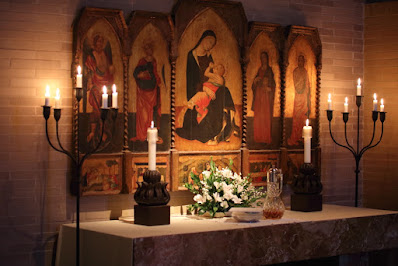
The opening words of today's gospel “After six days” have
been unfortunately left out of the
Lectionary. These simple words connect
today's gospel of the glory of Jesus transfigured on the mount with the first
prediction by Jesus of his passion--namely his being tortured and
killed--including the prediction that after three days he will rise again. The disciples Peter, James and John will be
given a vision of what his “rising again” means in the Transfiguration. They
are being taught that the glory that radiates from Jesus is intimately bound up with the
suffering he will endure in saving us from our sins. Thus, the passage in Mark is about two
mountains, that of transfiguration and that of disfiguration in the Crucifixion—Mounts Tabor and Calvary. In the
Synoptic accounts of the predictions of the Passion and today's miracle, St.
Peter is very adverse to the notion of Jesus suffering and dying. Peter is enthralled with the glory of the
Transfiguration, but wants Jesus to have no part in suffering and death. Perhaps, Peter is also defending himself and
James and John, for Jesus has indeed made it clear to them that they also will
suffer in order to enter into their glory: the words “take up the cross and
follow me” and “If anyone would be first, he must become the servant of all and
last of all.” form a frame around the Tabor narrative. The disciples, like Jesus, will be suffering
servants of the Lord.
Yes, that is true: if Christ, the
master, suffers, so must his disciples.
Lent can be for us a time of suffering, even in this beautiful
environment and community. The readings
and prayers of Lent in the office and mass, the chapter talks, our lectio, our
personal Lenten book and that gift of God called conscience make it all too
clear how far we are from the level of conversion and love of God and neighbor
that we desire. This is a very painful thought, a painful experience of
failure. St. Benedict writes of our Lenten “prayers with tears and compunction
of heart.” We think of the Transfiguration as the Father's affirmation of his
Beloved Son before the darkness of the Passion, and that by means of it
Jesus encourages his disciples Peter,
James and John in the face of their master's destruction at the hands of
powerful forces arrayed against him and later against them.
But we disciples who are gathered here
need encouragement as well, and we also can find it in the mystery of the
Transfiguration. I do believe that the
Transfiguration is also about us--basing myself on the principle that what
Jesus is by his divine nature, we are by grace.
The message of Christian suffering is not about a stoic acceptance of
the harsh and difficult aspects of
Christian and monastic life. The
chaos of suffering that we all experience is the chaos of the New Creation over
which the Spirit hovers with divine power.
There is a magnificent passage about our participation in the
Transfiguration in the section of the Catholic Catechism called the Mysteries
of Jesus' Public Life. “Jesus'
baptism proclaimed 'the mystery of the first regeneration,' namely, our
Baptism; the Transfiguration 'is the sacrament of the second regeneration': our
own Resurrection. From now on—from now
on--we share in the Lord's Resurrection through the Spirit who acts in the
sacraments of the Body of Christ.”
Please, notice that our own resurrection
is in the NOW, in every now as we make our pilgrim way through time fortified
and transfigured by the sacraments of the Body of Christ, the Church. The Trinity is manifest to us in our
participation in the Transfiguration: the Father's voice is heard telling us
resoundingly, “This is my beloved Son. Listen to him!”, the Spirit is manifest
as a cloud of unknowing, perhaps even the cloud of suffering, that emphasizes
and reveals the Taboric Light that shines forth from the clothing and face of
our Savior, Jesus Christ. This Taboric light shines on us. We see it even in the darkness of suffering
when we allow the gift of faith to open our eyes to God's love for us and the
grace He pours out on us. In the Son, we are God's beloved sons and
daughters. St. Paul reminded us, “If God
is for us, who can be against us?”
St. Benedict, it seems to me, is referring to
this Taboric light in the Prologue of the Rule when he refers to the deificum
lumen. Michael Casey insists that the
old translation of this as “divinizing light” is the better and more dynamic
than the static one in RB 1980.. The
passage is Prologue 9-10: “And
with eyes wide open to the divinizing light, and with astonished ears, let us
hear God's voice crying out to us every day and admonishing us: "Today if you
hear God's voice, harden not your hearts!'” This is monastic life in the light symbolism
and vocabulary of the Transfiguration, our divinization.
Today, in just a few minutes, on this holy mountain of Spencer, we will hear the divine voice crying out to us the words used by St. John, “Behold, the Lamb of God! Behold Him who takes away the sins of the world!” May the radiant light of our Lamp who is the Lamb illumine us in the darkness of our suffering and soften our hard hearts with gracious love for God and for our brothers and sisters. May our prayer with tears and compunction of heart transfigure into tears of joy. Blessed are all who are called to the wedding feast of the Lamb.
Photograph by Brother Jonah. Today's homily by Father Luke.






















